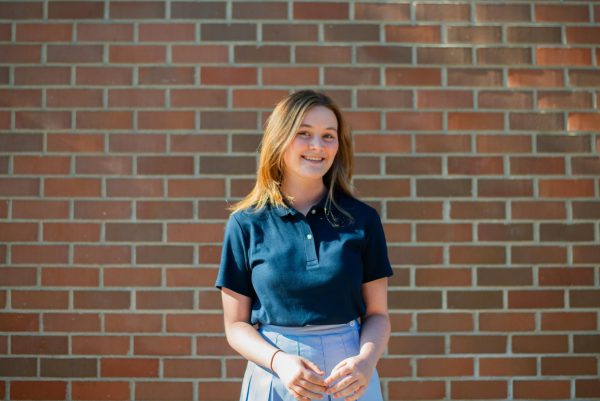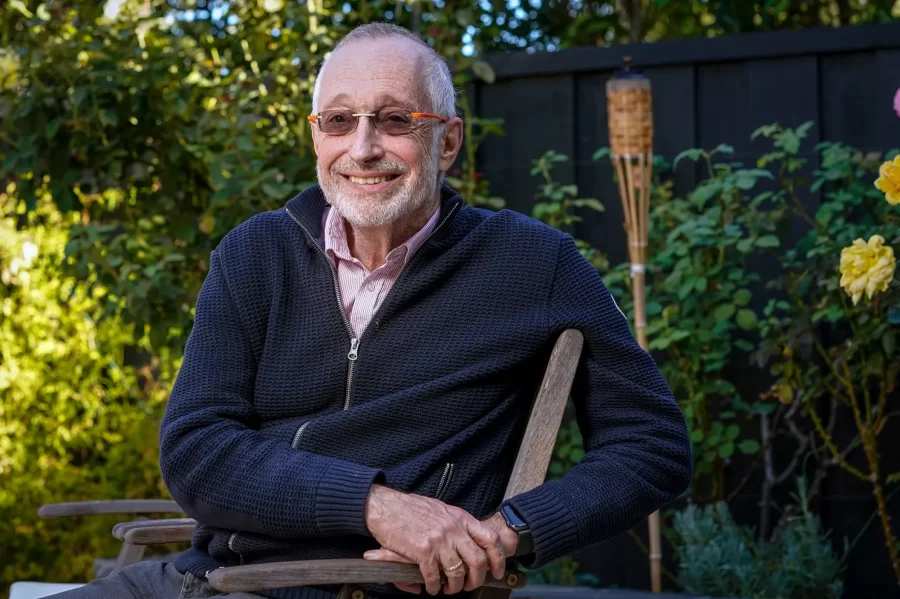A conversation with a Nobel Prize winner
There are many things on my bucket list; splitting a brownie with a Nobel Prize winner was not one of them. Yet, on a blustery day in late November, I sat down with Professor Paul Milgrom, father of Castilleja music teacher Joshua Thurston-Milgrom, outside of a Peet’s Coffee to talk about his work and experience winning the Sveriges Riksbank Prize in Economic Sciences in Memory of Alfred Nobel—also known as a Nobel Prize—in 2020. The interview, conducted over the aforementioned brownie, took place less than 24 hours before Professor Milgrom flew to Sweden to participate in the ceremonial festivities he was unable to attend when he won the award due to the COVID-19 pandemic.
The festivities include events such as a formal ball, a visit to the Nobel Prize Museum and dinner with the king. “It’s like out of a Disney movie,” remarked Mr. Thurston-Milgrom enthusiastically. “It’s almost like grown-up Halloween… dressing up like royalty and parading through fancy halls.”
In 1993, Paul Milgrom and his colleagues, including his advisor and co-recipient Robert Wilson, used Excel spreadsheets— “you know Excel?”— to program a user interface for an online auction as an alternative to the system the U.S. government planned to use for an upcoming spectrum auction. The team finished the project in only a month, and within three months the U.S. had adopted the system “lock, stock and barrel” and it began to spread throughout the world. “I never had such time pressure before,” he reflected. Nevertheless, Milgrom and Wilson’s work revolutionized the way goods difficult to value are auctioned off, such as licenses to transmit radio waves over certain areas of the world.
Mr. Thurston-Milgrom expressed only pride and happiness for his father’s success, but acknowledged that sometimes it can be difficult to have such an accomplished father. “Having such an accomplished father has two sides to it,” he told Counterpoint. “It can make me feel less accomplished.” Reflecting on these emotions, he stated, “It meant the world to me that when it happened, I was really just happy for him and proud of him… and able to let go of whatever comparisons there could be.”
The Nobel Prize is one of the most prestigious and well-known awards in the entire world; when asked about how it feels to be a recipient of such an accolade, the Stanford professor leaned back in his chair, arms crossed casually over his bright blue puffer jacket, and simply said, “fine—it’s good.” He went on to explain that this will be his fifth time attending the ceremonies: “I’m not sure how much Joshua’s told you,” he remarked anecdotally, “but I met my wife at the 1996 Nobel Prize dinner… she was seated next to me.”
While in the moment I wondered if Professor Milgrom’s nonchalant attitude was entirely a reflection of his profound humility, it soon became clear that he might also simply feel indifferent about the achievement. Reflecting on the prominence of the award, he shared that the “biggest thing about [winning] the Nobel Prize” for him was that his grandson, only nine years old at the time, knew of its significance and was excited to celebrate it. “I want my family to have a chance to celebrate,” he stated solemnly. “It’ll be good for them.”
“I really do think my dad is motivated by his work, not by the honors that come with it,” stated Mr. Thurston-Milgrom. “ I really believe that about him and I respect that about him.” To this point, he explained that one of the reasons his father has received these many accolades is because he doesn’t focus on the rewards. “You can’t win a Nobel Prize by devoting your life to winning a Nobel Prize. You can only win a Nobel Prize… by devoting your life passionately to your work.”
Professor Milgrom recalled that he became involved in academia almost entirely “by accident;” he originally came to Stanford planning to earn an MBA, but told Counterpoint, “my interests were actually much more similar to the faculty’s than the other students,” and said that his professors encouraged him to switch fields. “I could see that they were right, so I switched, and the people who convinced me happened to be economists.”
Professor Milgrom notes that teaching brings him great joy. “I have brilliant students,” he said. “Every year I see my students get excited, and that part is fun.” He also shared that since winning the Nobel Prize in 2020, his average class size has increased from around 30 students to upwards of 100.
Finally, Professor Milgrom has this advice for students. He said, “What’s important to study keeps changing over time,” he mused. “At the time that I was getting started, game theory was brand new. Nobody had made a success of it. We turned it into successful stuff… if you wanna have fun doing research, you gotta be on a cutting edge somewhere.”

Ruby Wright Dowling ’24 is an Editor-in-Chief of Counterpoint. She attended the Medill-Northwestern Journalism Institute in 2023 and is now an editorial...


